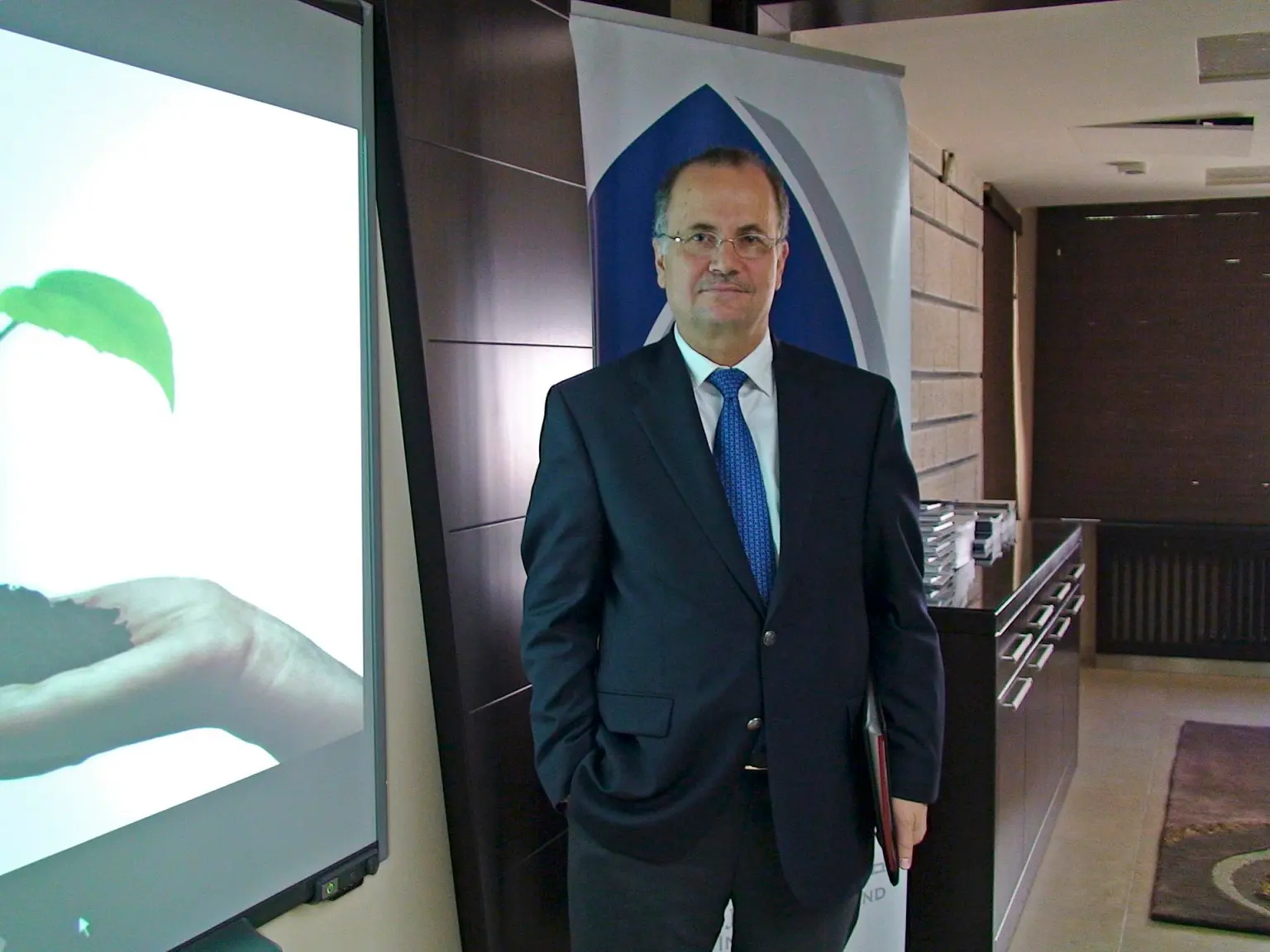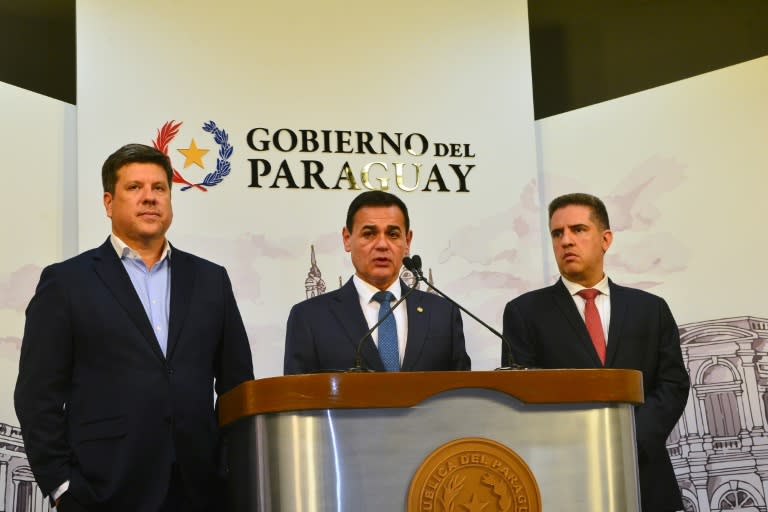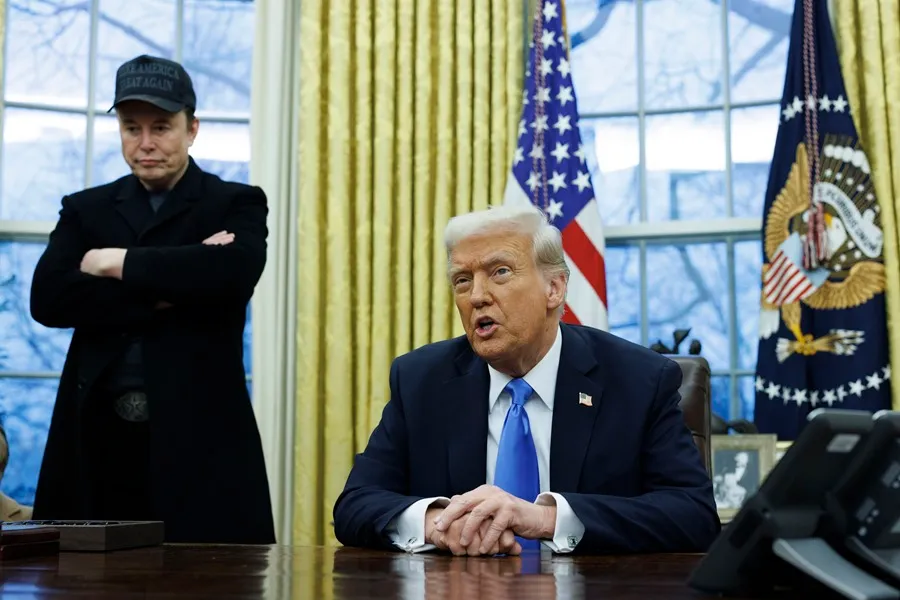International
Palestinian Prime Minister chosen by hand by Abbas presents new government with 22 ministers

The Palestinian Prime Minister, economist Mohamad Mustafa, presented on Thursday to President Mahmud Abbas the composition of a new government with 22 ministers, including at least three women, and in which he himself will head the Foreign Affairs portfolio.
“The Prime Minister-designate, Muhamad Mustafa, presented the work program and the composition of the government to President Mahmud Abbas,” the official Wafa news agency reported today, “consequently, the president issued a decree law giving confidence to the nineteenth government and issued a decree approving its formation.”
The new cabinet will take an oath this Sunday, March 31, and in its program one of the priorities is the Gaza Strip, including a plan to increase access to humanitarian aid and the reconstruction of the enclave, as well as create a stable Palestinian Authority, since it has been dejured by the majority of Palestinians for years.
Mustafa will hold the position of Minister of Foreign Affairs, replacing Riyad Al Malki; while Zyad Mahmoud Mohamed will serve as Minister of the Interior and Omar Akram Al Bitar, former Middle East executive of one of the world’s major consulting firms, PricewaterhouseCoopers, will be Minister of Finance.
Sharhabel Yusef Sad Edin will serve as Minister of Justice and Majid Awni Mohamed Abu Ramadan in Health, according to the official list. Among the ministers Mona Muhamad Mahmoud al Jalili will lead the Ministry of Women’s Affairs and Ahed Faeq Atef Bseiso, will be in charge of Public Works and Housing. Samah Abdel Rahim Hussein Hamad will be Minister of Social Development.
On March 14, President Abás appointed Mustafa as prime minister of the ANP, which controls the occupied territory of the West Bank in a fragmented way, and commissioned him to form a new government after the resignation two weeks before the entire cabinet along with the then prime minister, Mohamed Shtayeh.
Shatyeh’s resignation was understood as part of Abas’ efforts to reform the ANP with a technocratic government that can take control of the Gaza Strip when the war ends in the Palestinian enclave, something that is in the US future plans but not in those of the Israeli Prime Minister, Benjamin Netanyahu.
The ANP ruled in the Gaza Strip until 2007, when Hamas forcibly took power from the enclave after failing the attempts of a government of national unity with Fatah, after the Islamist group won in the 2006 legislative elections.
Although weakened and without any influence in Gaza – in December 2023 60% of Palestinians supported the dissolution of the ANP and 92% the resignation of Abas, according to the Palestinian Center for Policy and Survey Research – the ANP is the only entity accepted by Israel and a large part of the international community as an interlocutor of the Palestinians.
International
Paraguay summons Brazilian ambassador over Itaipú espionage scandal

Paraguay summoned the Brazilian ambassador in Asunción on Tuesday to demand “explanations” and called its own representative in Brasília for consultations following Brazil’s acknowledgment of an espionage operation. The Brazilian government, led by President Luiz Inácio Lula da Silva, attributed the operation to the previous administration.
The surveillance effort aimed to uncover Paraguay’s position in now-suspended negotiations with Brazil regarding the pricing of electricity from the binational Itaipú hydroelectric plant, according to reports in the Brazilian press.
The Brazilian government “categorically denied any involvement in the intelligence operation,” stating in a Foreign Ministry communiqué on Monday that the espionage was carried out under former President Jair Bolsonaro’s administration (2019-2023).
“The operation was authorized by the previous government in June 2022 and was annulled by the interim director of the (state intelligence agency) ABIN on March 27, 2023, as soon as the current administration became aware of it,” Brazil’s government asserted.
Paraguay’s Foreign Minister Rubén Ramírez announced that Brazilian Ambassador José Antonio Marcondes de Carvalho was summoned “to provide detailed explanations” regarding the operation. Additionally, Paraguay recalled its diplomatic representative in Brasília “to report on aspects related to the intelligence activity conducted by Brazil regarding Paraguay’s government affairs.”
International
Elon Musk to step down as government advisor, per Trump insiders

President Donald Trump has informed his inner circle that Elon Musk will be stepping down from his role as a government advisor, according to a report by Politico today.
Citing three individuals close to Trump, Politico states that the president is pleased with Musk’s leadership at the Department of Government Efficiency (DOGE), where he has implemented significant budget cuts. However, both have agreed that it is time for Musk to return to his businesses and support Trump from a different position outside the government.
A senior administration official told Politico that Musk will likely maintain an informal advisory role and continue to be an occasional visitor to the White House. Another source warned that anyone thinking Musk will completely disappear from Trump’s circle is “deluding themselves.”
According to the sources, this transition is expected to coincide with the end of Musk’s tenure as a “special government employee,” a temporary status that exempts him from certain ethics and conflict-of-interest regulations. This 130-day period is set to expire in late May or early June.
International
Milei vows to make Argentina so strong that Falkland Islanders “choose” to join

Argentine President Javier Milei reaffirmed his country’s claim over the Falkland Islands (known as the Islas Malvinas in Argentina) and praised the role of the nation’s armed forces during a ceremony marking the “Veterans and Fallen Soldiers of the Malvinas War Day,” commemorating 43 years since the 1982 conflict with the United Kingdom.
Argentina continues to assert sovereignty over the islands, arguing that Britain unlawfully seized them in 1833.
“If sovereignty over the Malvinas is the issue, we have always made it clear that the most important vote is the one cast with one’s feet. We hope that one day, the Malvinas residents will choose to vote with their feet and join us,” Milei stated.
“That is why we aim to become a global power—so much so that they would prefer to be Argentine, making deterrence or persuasion unnecessary. This is why we have embarked on a path of liberation, working to make Argentina the freest country in the world and once again the nation with the highest GDP per capita on the planet,” he added.
-

 International5 days ago
International5 days agoSon of journalist José Rubén Zamora condemns father’s return to prison as “illegal”
-

 Central America3 days ago
Central America3 days agoU.S. Homeland Security Secretary urges Mexico to strengthen Guatemala border
-

 International5 days ago
International5 days agoMiyazaki’s style goes viral with AI but at what cost?
-

 Central America4 days ago
Central America4 days agoPanama police clarifies that Interpol alert for Martinelli is still pending
-

 International3 days ago
International3 days agoTrump urges Putin to reach peace deal
-

 International24 hours ago
International24 hours agoParaguay summons Brazilian ambassador over Itaipú espionage scandal
-

 Central America3 days ago
Central America3 days agoPanama grants Martinelli 72-hour extension to travel to Nicaragua
-

 International4 days ago
International4 days agoDeportation flight lands in Venezuela; government denies criminal gang links
-

 Sports24 hours ago
Sports24 hours agoFilipe Luis debuts as coach in Copa Libertadores with Flamengo
-

 Central America21 hours ago
Central America21 hours agoGuatemalan police officer killed in mob riots over baby kidnapping
-

 International24 hours ago
International24 hours agoElon Musk to step down as government advisor, per Trump insiders
-

 International24 hours ago
International24 hours agoICE agent’s arrest of suspect sparks controversy in Boston
-

 International24 hours ago
International24 hours agoMilei vows to make Argentina so strong that Falkland Islanders “choose” to join
-

 Sports24 hours ago
Sports24 hours agoVenezuela investigates 18 baseball players seeking asylum in Spain
-

 International24 hours ago
International24 hours agoÓscar Arias: Trump’s trade policies are a step backward















